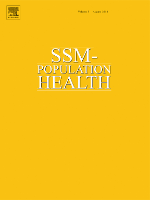
SSM-Population Health
Scope & Guideline
Empowering research for a healthier tomorrow.
Introduction
Aims and Scopes
- Social Determinants of Health:
The journal focuses on how social, economic, and environmental factors affect health outcomes across different populations, emphasizing the need for a comprehensive understanding of these determinants. - Health Disparities and Inequities:
A significant area of research involves investigating health disparities among various demographic groups, including considerations of race, ethnicity, socioeconomic status, and gender, to inform equitable health interventions. - Quantitative and Qualitative Research Methods:
The journal employs both quantitative and qualitative methodologies, allowing for a multifaceted exploration of health issues, including longitudinal studies, cross-sectional analyses, and systematic reviews. - Global Health Perspectives:
Research published in SSM-Population Health often includes global health issues, addressing the unique challenges faced by populations in different geographical and cultural contexts. - Impact of Policy and Interventions:
The journal evaluates the effectiveness of public health policies and interventions on population health, providing evidence-based recommendations for practitioners and policymakers. - Mental Health and Wellbeing:
There is a consistent emphasis on mental health, exploring its interplay with physical health, social factors, and economic conditions, and the impact of mental health interventions.
Trending and Emerging
- Intersectionality in Health Research:
There is an increasing focus on intersectional analysis, examining how overlapping social identities (e.g., race, gender, socioeconomic status) affect health outcomes and access to care. - Mental Health and Social Wellbeing:
Research on mental health, particularly how it interrelates with socioeconomic factors, has gained prominence, especially in the context of the COVID-19 pandemic and its aftermath. - Health Equity and Justice:
An emerging theme is the emphasis on health equity and social justice, with studies advocating for policies aimed at reducing health disparities and promoting equitable access to healthcare. - Impact of Climate Change on Health:
Research exploring the health implications of climate change and environmental factors is on the rise, reflecting growing global concerns about sustainability and health. - Digital Health and Technology:
The integration of digital health technologies and telehealth solutions into research is trending, especially in light of the COVID-19 pandemic, which has accelerated their adoption. - Community Engagement in Health Research:
There is a notable increase in studies that involve community engagement and participatory research methods, emphasizing the importance of local knowledge and stakeholder involvement in health initiatives.
Declining or Waning
- Traditional Epidemiological Studies:
There has been a noticeable decrease in purely traditional epidemiological studies that do not integrate social determinants or policy implications, as the journal increasingly emphasizes more complex, multifactorial approaches. - Single-Disease Focus:
Research focusing exclusively on single diseases without considering comorbidities or broader health contexts is less frequently published, as the journal encourages a more holistic view of health. - Static Health Metrics:
The use of static health metrics, such as prevalence rates without considering longitudinal changes or interventions, appears to be waning in favor of dynamic and context-specific analyses. - Local Case Studies without Broader Implications:
Local studies that fail to connect findings to broader population health implications or policy discussions are less common, as the journal aims to ensure that research contributes to global health discourse. - Focus on Individual Risk Factors:
There is a declining trend in studies that examine health outcomes based solely on individual risk factors without considering the influence of community and structural factors.
Similar Journals

Epidemiology and Psychiatric Sciences
Connecting science and practice for improved mental health outcomes.Epidemiology and Psychiatric Sciences is a leading open-access journal published by Cambridge University Press, dedicated to advancing the fields of epidemiology, psychiatry, and public health. With a strong impact reflected in its Q1 ranking in three critical areas—Epidemiology, Psychiatry and Mental Health, and Public Health, Environmental and Occupational Health—this journal stands at the forefront of interdisciplinary research. Since its inception in 2011, Epidemiology and Psychiatric Sciences has provided a platform for researchers and practitioners to share innovative findings, with the aim of improving mental health outcomes and addressing public health challenges. The journal's commitment to open access, a practice adopted in 2020, ensures that vital research is available to a broader audience, further facilitating knowledge dissemination. Researchers, professionals, and students in these domains will find the journal an invaluable resource in navigating the complex interplay between various factors influencing mental health and well-being.

Health Promotion and Chronic Disease Prevention in Canada-Research Policy and Practice
Pioneering research that influences health promotion in Canada.Health Promotion and Chronic Disease Prevention in Canada - Research Policy and Practice is a leading open-access journal published by the Public Health Agency Canada. This journal, indexed with the ISSN 2368-738X, is dedicated to advancing the field of health promotion while addressing chronic disease prevention in the Canadian context. Since its inception in 2008, it has gained a robust reputation, evidenced by its ranking in the second quartile (Q2) across multiple categories including Epidemiology, Health Policy, and Public Health, Environmental and Occupational Health. With its emphasis on research and policy implications, the journal serves as a critical resource for researchers, healthcare professionals, and students alike, aiming to promote evidence-based practices and driving discussions that shape public health policies. The journal is particularly noted for its triangulation of research findings into actionable strategies, making it relevant for both academic inquiry and practical application. Whether you are seeking to enhance your knowledge or contribute to the discourse on chronic disease prevention, this journal offers a platform for sharing impactful research and innovative ideas.
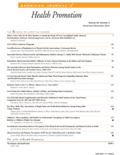
AMERICAN JOURNAL OF HEALTH PROMOTION
Elevating public health through rigorous research.Welcome to the American Journal of Health Promotion, a premier journal dedicated to advancing the field of health promotion through rigorous research and practical application. Published by SAGE Publications Inc, this esteemed journal holds an impressive impact factor and is recognized in the top quartile (Q1) of two critical categories: Health (Social Science) and Public Health, Environmental and Occupational Health, according to 2023 assessments. Covering a broad spectrum of health promotion topics, the journal serves as a vital resource for researchers, professionals, and students alike, providing cutting-edge insights from 1986 to 2024. With Scopus rankings of 96th in Social Sciences and 226th in Medicine, it sits among the most influential publications in its field. Although not currently an open-access journal, it ensures that all contributors can share findings that significantly impact health policy and practices. Located in Thousand Oaks, California, the American Journal of Health Promotion is at the forefront of promoting health knowledge and action, making it an essential read for anyone committed to enhancing community health and well-being.

BMC PUBLIC HEALTH
Connecting minds to elevate public health standards.Welcome to BMC Public Health, a premier open-access journal published by BMC, dedicated to advancing research in the fields of public health, environmental, and occupational health. Since its inception in 2001, BMC Public Health has emerged as a leading platform for disseminating high-quality research, achieving a remarkable Q1 ranking in 2023 within its category, and earning a notable position of rank #114 out of 665 in Scopus, reflecting its impact and relevance in a competitive field. With a commitment to open-access publishing, the journal ensures that research findings are accessible to a global audience, fostering collaboration and knowledge sharing among researchers, professionals, and students alike. Based in the United Kingdom, BMC Public Health aims to address pressing issues in public health through innovative research and comprehensive reviews, making significant contributions to policy-making and best practices worldwide. We invite you to explore the wealth of knowledge and contributions made by authors in this essential publication.
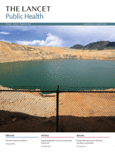
Lancet Public Health
Advancing global health through transformative research.The Lancet Public Health is a leading journal in the field of public health, published by Elsevier since 2016. With its prominent Q1 quartile ranking in Public Health, Environmental and Occupational Health according to Scopus for 2023, and an impressive percentile ranking of 99th, the journal has established itself as a vital resource for researchers, professionals, and students committed to advancing public health knowledge and practices. Operating under an Open Access model, this journal ensures that groundbreaking research is readily accessible to all, promoting global collaboration and knowledge sharing. The scope of The Lancet Public Health encompasses diverse aspects of health, including the social determinants of health, epidemiology, health policy, and preventive medicine, making it a cornerstone for addressing contemporary public health challenges. Located in the heart of the United Kingdom, it aims to influence health policies and practices worldwide, showcasing transformative research and fostering vibrant discussions within the field.

Economics & Human Biology
Bridging Economics and Health for a Better TomorrowEconomics & Human Biology, published by Elsevier, is a prestigious journal that serves as an interdisciplinary platform at the intersection of economics and health sciences. With ISSN 1570-677X and E-ISSN 1873-6130, this journal analyzes the implications of economic factors on human health and biological outcomes. As a recognized leader in its field, it has earned a remarkable Q1 ranking in both the Economics, Econometrics and Finance (miscellaneous) and Health (social science) categories for 2023, reflecting its significant impact within the academic community, as evidenced by its Scopus rank of 88 out of 371 and a 76th percentile ranking in Health social sciences. Highlighting key issues such as health disparities, economic policy impacts on health, and the biological determinants of economic behavior, the journal encourages innovative research that bridges these critical domains. Researchers, professionals, and students seeking to contribute to or stay informed on emerging trends in health economics will find this journal an invaluable resource. Explore the latest findings and engage with a community dedicated to advancing our understanding of the interplay between economics and human biology.
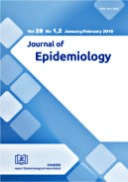
JOURNAL OF EPIDEMIOLOGY
Unveiling insights that shape global healthcare.JOURNAL OF EPIDEMIOLOGY is a premier peer-reviewed journal published by the JAPAN EPIDEMIOLOGICAL ASSOCIATION dedicated to advancing the field of epidemiology and public health. With an impressive impact factor and recognition as a Q1 journal in both the epidemiology and miscellaneous medicine categories, it ranks in the top percentile of its field, occupying the 28th position out of 148 journals in epidemiology according to Scopus. Since its inception in 1991, this open access journal has provided researchers, practitioners, and students with valuable insights and findings that shape healthcare policies and practices globally. The journal covers a broad range of topics within epidemiology, fostering a multidisciplinary approach to understanding and addressing health challenges. With a commitment to high-quality research and accessibility, the JOURNAL OF EPIDEMIOLOGY plays a crucial role in the dissemination of knowledge and best practices within the public health community.

Journal of Migration and Health
Empowering Research for Healthier Migrant LivesJournal of Migration and Health, published by ELSEVIER, is a leading open access journal dedicated to exploring the intersection of migration and health, a critical area of study in contemporary social sciences. Since its inception in 2020, this journal has quickly established itself in the academic community, earning a prestigious Q1 ranking in several categories including Demography, Health (Social Science), Infectious Diseases, and Sociology and Political Science for 2023. With an impactful presence reflected in its Scopus Rankings—such as Rank #15 in Demography and Rank #57 in Health (social science)—the journal serves as a vital platform for researchers, practitioners, and students interested in understanding the complex health dynamics affecting migrant populations. The journal promotes scholarly discourse through rigorous peer-reviewed articles, fostering knowledge that informs health policies and practices relevant to migrants across the globe. For those keen on delving into pressing health issues influenced by migration trends, the Journal of Migration and Health offers rich insights and research opportunities, playing an essential role in shaping the future of health studies in a global context.

Public Health in Practice
Championing open-access research for global health challenges.Public Health in Practice is an influential open-access journal published by ELSEVIER, dedicated to advancing knowledge in the fields of health policy and public health. Since its inception in 2020, this journal has quickly established itself within the academic community, with notable rankings including Q2 in both Health Policy and Public Health, Environmental and Occupational Health, reflecting its commitment to publishing high-quality research. The journal operates out of the Netherlands and has adopted an open-access model to ensure that research is freely available to professionals, researchers, and students alike, facilitating knowledge sharing and impactful discussions. With a Scopus rank of #164 in Health Policy and #352 in Public Health, the journal aims to bridge gaps in research while fostering innovative solutions to contemporary public health challenges. Highly relevant to today's dynamic healthcare landscape, Public Health in Practice encourages submissions that contribute to evidence-based practices and advocate for effective public health policies.
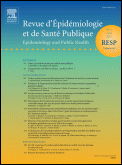
REVUE D EPIDEMIOLOGIE ET DE SANTE PUBLIQUE
Championing rigorous research for healthier communities.REVUE D EPIDEMIOLOGIE ET DE SANTE PUBLIQUE is a prominent academic journal published by MASSON EDITEUR, dedicated to advancing research in the fields of epidemiology and public health. Established in 1976, this journal serves as a vital platform for disseminating high-quality research, comprehensive reviews, and innovative methodologies that address pressing health issues in France and beyond. With an emphasis on both environmental and occupational health, the journal holds a Q3 ranking in both Epidemiology and Public Health categories, reflecting its significant impact within the scholarly community. While the journal does not offer Open Access, it continues to attract a diverse audience of researchers, professionals, and students who value rigorous scientific inquiry and collaboration. This resource is essential for those seeking to stay informed about current trends, challenges, and advancements in public health and epidemiological research.